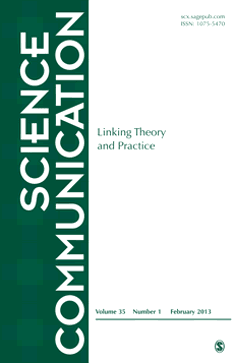
SCIENCE COMMUNICATION
Scope & Guideline
Innovating Communication Strategies for a Scientific World
Introduction
Aims and Scopes
- Interdisciplinary Approaches to Science Communication:
The journal encourages submissions that adopt interdisciplinary perspectives, integrating insights from fields such as sociology, psychology, education, and communication studies to enrich the discourse on science communication. - Impact of Media on Public Perception of Science:
Research focusing on how various media forms influence public perceptions of scientific issues, including misinformation, media framing, and the role of social media platforms in shaping public discourse. - Science Education and Literacy:
Studies that explore effective strategies for teaching science, enhancing scientific literacy, and fostering critical thinking skills among diverse audiences, particularly in educational settings. - Policy and Governance in Science:
Articles that analyze the intersection of science communication with public policy, governance, and ethical considerations, particularly in the context of emerging technologies and public health crises. - Cultural and Social Dimensions of Science:
Exploration of how cultural, social, and contextual factors shape the communication and understanding of scientific knowledge, including the role of identity, community engagement, and participatory approaches.
Trending and Emerging
- Engagement with Diverse Audiences:
There is a growing emphasis on strategies that effectively engage diverse audiences, including marginalized communities, youth, and non-experts, to democratize science communication and make it more inclusive. - The Role of Digital Media and Technology:
Research focusing on the impact of digital media and technology on science communication practices is increasing, exploring how platforms like social media, podcasts, and virtual reality can enhance public engagement. - Addressing Misinformation and Disinformation:
As misinformation becomes a critical concern, there is a surge in studies aimed at understanding its dynamics and developing strategies to combat it through effective science communication. - Participatory and Community-Based Approaches:
There is a significant trend towards participatory science communication methods that involve communities in the research process, fostering co-production of knowledge and enhancing public trust in science. - Interdisciplinary Collaboration:
The journal is increasingly publishing works that highlight the importance of interdisciplinary collaboration in science communication, integrating insights from social sciences, humanities, and technology studies to address complex scientific issues.
Declining or Waning
- Traditional Science Communication Models:
There has been a noticeable decline in research focused on traditional models of science communication that emphasize a one-way transmission of information from scientists to the public, as newer, more participatory models gain traction. - Narrow Focus on Specific Scientific Disciplines:
Papers that concentrate exclusively on specific scientific disciplines without considering interdisciplinary contexts or broader societal implications are becoming less frequent, indicating a shift towards more holistic approaches. - Static Communication Strategies:
The exploration of static communication strategies, such as simple informational pamphlets or lectures, is waning as the field increasingly prioritizes dynamic, interactive, and engaging methods of communication. - Overemphasis on Negative Framing of Science Issues:
Research focusing predominantly on negative aspects of science communication, such as public distrust or backlash against science, is decreasing, suggesting a shift towards more constructive and solution-oriented narratives. - Limited Engagement with Emerging Technologies:
Research examining the role of emerging technologies (e.g., AI, VR) in science communication has not been as prevalent, indicating a potential area that requires more attention in future studies.
Similar Journals
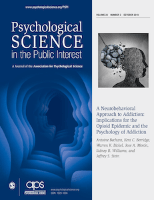
Psychological Science in the Public Interest
Innovating discourse with evidence-based psychological research.Psychological Science in the Public Interest is a premier academic journal dedicated to advancing the understanding of psychological science and its application in societal contexts. Published by SAGE Publications Ltd, this influential journal boasts an impressive impact factor and consistently ranks in the top tier, currently categorized as Q1 in Psychology (miscellaneous) and holding a remarkable Scopus rank of #2 out of 216 in the General Psychology category, placing it in the 99th percentile for its field. The journal spans a comprehensive range of topics, focusing on key issues at the intersection of psychology and public policy, making it an essential resource for researchers, professionals, and students alike. With articles that synthesize empirical research and offer actionable insights, Psychological Science in the Public Interest plays a critical role in bridging the gap between academic research and real-world applications, encouraging informed policy-making and public discourse in the United States and beyond.

Canadian Journal of Communication
Navigating the Complexities of Communication TheoryCanadian Journal of Communication, published by University of Toronto Press Inc., serves as a vital conduit for scholarly discourse within the field of communication studies. With an ISSN of 0705-3657 and an E-ISSN of 1499-6642, this esteemed journal holds a Q2 ranking in the category of Communication according to 2023 metrics, reflecting its commitment to high-quality research and innovation. Located in Canada and covering converged years from 2016 to 2024, the journal provides a comprehensive platform for the exchange of ideas, critical analyses, and theoretical advancements that shape our understanding of communication in contemporary society. Although it does not currently offer open access, the journal’s influence is demonstrated by its position in Scopus, ranking #332 out of 511 in the Social Sciences Communication category. This publication is essential for researchers, professionals, and students seeking to deepen their knowledge in communication contexts and explore the intricate dynamics that define human interaction.
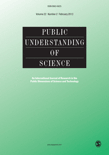
PUBLIC UNDERSTANDING OF SCIENCE
Exploring the Dynamics of Public PerceptionPUBLIC UNDERSTANDING OF SCIENCE, published by SAGE PUBLICATIONS LTD, stands as a crucial multidisciplinary journal dedicated to exploring the intricate relationship between science and society. With its well-established history from 1992 through to 2024, this journal offers an essential platform for researchers, professionals, and students interested in the communication of scientific knowledge and its impact on public perception. Recognized for its high academic standards, it proudly holds a Q1 ranking in the categories of Arts and Humanities, Communication, and Developmental and Educational Psychology, signifying its significant influence and contribution to these fields. The journal’s impressive percentile rankings further underscore its vital role in advancing scholarship, interaction, and understanding in the public discourse of science. Although it does not currently offer open access options, the journal is committed to disseminating scholarly research that informs and enriches the dialogue on critical scientific issues, making it a pivotal resource for anyone engaged in or studying the dynamics of science communication.
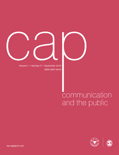
Communication and the Public
Empowering voices through scholarly exploration of communication.Communication and the Public is an esteemed journal dedicated to advancing the field of communication studies, published by SAGE Publications Ltd. With its focus on the interplay between communication practices and public engagement, the journal serves as a crucial platform for researchers, professionals, and students alike. Established in 2016 and continuing through to 2024, it holds a prestigious Q1 rank in Communication, underscoring its significant contributions to scholarly discourse—evidenced by its solid placement in the Scopus Ranks at 131 out of 511 in the Social Sciences Communication category, positioning it in the top 74th percentile. While it currently operates under a traditional access model, the journal aims to foster open dialogue and disseminate impactful research that shapes public understanding of communication processes. With an ISSN of 2057-0473 and an E-ISSN of 2057-0481, Communication and the Public continues to be an essential resource for those seeking to explore the nuances of communication in public contexts.
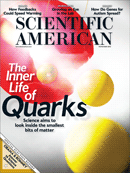
SCIENTIFIC AMERICAN
Empowering Knowledge Through Multidisciplinary InsightsSCIENTIFIC AMERICAN, published by Springer, stands as a prestigious multidisciplinary journal dedicated to disseminating cutting-edge scientific knowledge across a range of fields. Established in 1947, this journal has been integral in bridging the gap between scientific research and public understanding, making complex ideas accessible to a broader audience. With an ISSN of 0036-8733 and E-ISSN of 1946-7087, it maintains a strong standing within the academic community, currently ranked in the Q3 category for its multidisciplinarity, and is positioned at #93 out of 120 in its Scopus ranking, reflecting its valuable contribution to scientific discourse. While the journal is not open access, its long history and commitment to knowledge sharing ensure it remains a vital resource for researchers, professionals, and students alike, fostering a deeper appreciation of science in society.

Communitas
Advancing Knowledge Through Scholarly ExchangeCommunitas, published by the University of the Free State, is an esteemed open-access journal that has been a gateway for innovative research and discourse in the fields of communication, linguistics, and language since its inception in 2017. With an ISSN of 1023-0556 and E-ISSN of 2415-0525, the journal aims to foster scholarly exchange by providing a platform for critical analysis and interdisciplinary collaboration. Although it currently falls into Q4 in Communication and Q3 in Linguistics and Language, *Communitas* has made significant strides in establishing its presence in Scopus rankings—ranking 567 out of 1088 in Arts and Humanities and 397 out of 511 in Communication—and sources for researchers at varying stages of their careers. Addressed to a global readership, the journal invites contributions that enhance understanding and generate new perspectives on socio-linguistic issues and communicative practices, making it a pivotal resource for researchers, academics, and students committed to advancing knowledge in these dynamic fields.
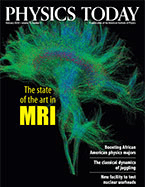
PHYSICS TODAY
Connecting Innovators in Physics and AstronomyPHYSICS TODAY is a prestigious journal published by the American Institute of Physics, serving as a pivotal platform for the dissemination of innovative research and developments in the field of physics and astronomy. With an ISSN of 0031-9228 and an E-ISSN of 1945-0699, this journal has been in circulation since 1948 and is set to continue until 2024. Recognized for its substantial contributions to the scientific community, PHYSICS TODAY holds a significant position within the Q2 quartile of the Physics and Astronomy category as of 2023. Although it does not offer open access, its articles remain crucial resources for researchers, professionals, and students seeking to stay abreast of the latest advancements across a broad range of topics in general physics and astronomy. With a current Scopus ranking of #150 out of 243 and a percentile standing at 38, the journal bolsters its reputation as a reliable source for high-quality scientific discourse. In an era of rapid scientific advancement, PHYSICS TODAY remains dedicated to fostering a deeper understanding of the physical universe, making it an essential read for those invested in the future of physics.

Environmental Communication-A Journal of Nature and Culture
Engaging Minds in the Dialogue of Nature and CultureEnvironmental Communication: A Journal of Nature and Culture, published by Routledge Journals, Taylor & Francis Ltd, is a leading interdisciplinary journal dedicated to the exploration of the dynamic relationships between environmental issues, communication practices, and cultural contexts. With ISSN 1752-4032 and E-ISSN 1752-4040, this journal plays a crucial role in advancing knowledge within the field, buoyed by its impressive Q1 rankings in both Environmental Science (Miscellaneous) and Management, Monitoring, Policy, and Law as of 2023. The journal engages with a broad audience, including researchers, professionals, and students, by providing a platform for critical discussions on how communication impacts environmental governance and cultural perceptions of nature. The journal's commitment to scholarly rigor ensures its significant impact, evidenced by its Scopus rankings—38th out of 219 in environmental science and 94th out of 399 in management, monitoring, policy, and law—placing it in the top percentiles of its categories. Although it does not offer open access at this moment, the range of topics covered from 2010 to 2024 promises to enrich the dialogue surrounding environmental advocacy, policy-making, and cultural narratives, making it an essential resource for anyone invested in environmental communication.

Metode Science Studies Journal
Pioneering New Perspectives in Science StudiesMetode Science Studies Journal, published by UNIV VALENCIA, BOTANICAL GARDEN UV, is an esteemed open-access journal dedicated to advancing scholarly discourse in the fields of history and philosophy of science and multidisciplinary studies. Since its inception in 2013, the journal has positioned itself as a vital resource for researchers, professionals, and students, fostering an environment for innovative research and cross-disciplinary dialogue. Based in the vibrant city of Valencia, Spain, this journal aims to publish high-quality articles that explore the intricate relationships between scientific practices and philosophical inquiries. With a current impact factor demonstrating its relevance in the academic community, the journal is indexed in Scopus, ranking in the 52nd percentile for history and philosophy of science and the 33rd percentile for multidisciplinary studies. Scholars can access a breadth of research outputs that span from 2015 to 2024, thereby contributing significantly to the intellectual landscape of the respective fields.
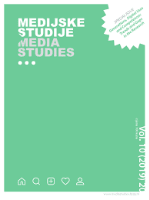
Medijske Studije-Media Studies
Unveiling the Impact of Media on Modern LifeMedijske Studije-Media Studies, an esteemed journal published by SVEUCILISTE & ZAGREBU, FAK POLITICKIH ZNANOSTI, is a pivotal platform in the field of communication studies and media research. Established in Croatia, this Open Access journal since 2010 features a diverse array of research articles that explore the multifaceted relationships between media and society. With its ISSN 1847-9758 and E-ISSN 1848-5030, the journal serves an international audience and is committed to disseminating innovative insights that drive media scholarship forward. Currently ranked in the Q3 category in Communication and Q4 in Computer Science Applications for 2023, it reflects its growing influence, capturing vital trends and analyses that resonate in both academic and practical realms. The journal's Scopus rank sits at #337 out of 511 in Social Sciences_ Communication, placing it within the 34th percentile, thus establishing its relevance in the global discourse on communication. Researchers, professionals, and students are encouraged to engage with this resource as it continues to forge connections between media studies and contemporary societal issues.